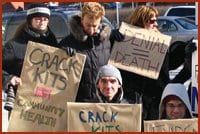An inexpensive program that keeps drug users from contracting HIV and hepatitis was canned by city hall Jul 11, but those involved with the safer inhalation program say they could keep distributing pipes without city funds.
“There’s still the impetus to provide support to those who use our services,” says Adam Graham of the AIDS Committee Of Ottawa.
Graham is not discounting the possibility that outreach workers will keep distributing the pipes even though the city has withdrawn its funding. He says that in other Canadian jurisdictions, health workers have gone ahead with similar programs when municipal governments have balked at provided harm reduction strategies.
“Looking into what the implications are is really worthwhile,” he says.
This would put health care workers in a legally ambiguous position of providing drug paraphernalia — and leave staff and volunteers at the mercy of the Ottawa Police, says Graham.
After city council killed the crack pipe program on Jul 11, Ottawa’s new police chief Vernon White said he still wished to see a review of the program to determine the medical impacts, indicating his willingness to tolerate the program.
And since the province provides the lion’s share of funding, Ontario minister of health promotion (and former Ottawa mayor) Jim Watson told reporters he was meeting with White, the city’s top health official, David Salisbury and Mayor Larry O’Brien this week about the program.
Metal pipes heat up, drying and cracking the lips of users. This leaves them, and other users of the pipe, vulnerable to contracting blood-borne infections like HIV.
Harm reduction programs like this one keep users from catching incurable diseases until they’re ready to quit. Pioneered by gay activists in the early days of AIDS, harm reduction was presented as an alternative to the medical profession’s calls for abstinence and reactionary politicians’ calls for quarantine.
Evidence gathered by University Of Ottawa researchers on behalf of the City Of Ottawa shows that the program has caused drug users to switch from using injection drugs to using the pipes, which is safer. It also reduced the frequency of pipe sharing. Advocates also point out that the program has exposed many of Ottawa’s drug users to health professionals for the first time, meaning they have greater access to health information and counselling options.
“We had an inkling,” that the program would come under attack, says Graham, which explains why ACO rallied in Feb at budget time and also faced off against Sandy Hill conservatives on Jul 11, counter-protesting an anti-crack pipe demonstration led by about 25 area business owners and residents. With Mayor O’Brien opposed, organizations supporting harm reduction girded their loins.
The Integrated Drug Strategy plan adopted by city hall yesterday had called for a review of the pipe program, but Rick Chiarelli introduced a motion to abandon safer inhalation altogether.
Despite Chiarelli, the program will continue, at least for now.
“We’ve heard conflicting information. As far as we know, we have until the 31st of July for ordering supplies,” says Graham.
The mayor and 14 councillors voted to nix the program. The mayor and a regular roster of suburban reps were joined by River councillor Maria McRae, Kitchissippi councillor Christine Leadman (whose ward includes Westboro and Hintonburg) and College councillor Chiarelli.
Seven councillors did not support the motion, six representing inside-the-greenbelt ridings — Diane Deans, Diane Holmes, Clive Doucet, Jacques Legendre, Peter Hume, and Michel Bellemare — plus Kanata councillor Peggy Feltmate. Georges Bedard and Alex Cullen were absent from the vote.
Those councillors who voted to kill the program should be held accountable, Graham says, and filing a human rights complaint might be the next step.
“It’s an interesting question. If addiction is covered under human rights codes under disability, and it is in Ontario and federally, community organizations should be asking themselves is how does this implicate councillors in human rights abuses when despite the mountain of evidence presented by Dr Salisbury, they’ve cancelled a program, as non-health professionals, that is reducing transmission [of HIV/AIDS and hepatitis].”


 Why you can trust Xtra
Why you can trust Xtra


